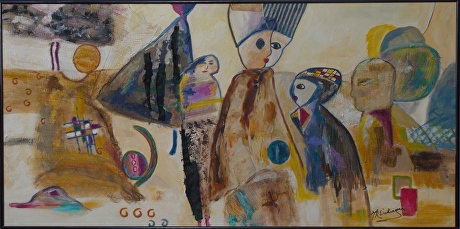
Family in a Turkish Village
Living in crowded communities requires residents to be polite, understanding, and respectful of different views.
You Can’t Do It Alone
Ethics. It’s a word not on the tip of an educator’s tongue these days. Ethics are the moral principles that govern behavior. But there is such a fear of offending someone’s beliefs that the topic takes a back seat. I rarely hear talk about a liberal education focused more on asking questions than giving answers. Such a curriculum aims to prepare students to deal with complexity, diversity, and change.
Liberal education programs aim to produce virtuous, ethical adults knowledgeable in many fields. It combines ethics, philosophy, psychology, and compassion by focusing on transformative thinking rather than concrete information–an approach that dates back to the Ancient Greeks. Arithmetic, music, and astronomy were added to the curriculum in the Middle Ages. The Natural Sciences and Formal Sciences were included during the twentieth century, though not to overpower the classical subjects. The liberal arts create wholesome thinking and tolerance that is hard to obtain if indoctrinated into a narrow way of thinking. Changing a communal ethos is not a speedy fix to be made in the privacy of an individual’s office.
Unfortunately, the number of students enrolling in a liberal arts curriculum has shrunk because of jobs requiring specific degrees other than the arts and humanities. It doesn’t help that the word “liberal” carries connotations that bother conservative parents. But most of the decrease is due to globalization giving rise to occupations in the tech sector. More students opt for a STEM curriculum leading to fields in engineering, computer science, and medicine, where they become narrowly focused and project-oriented rather than dwell on the big picture.
The arts, ethics, history, and philosophy are subjects focused on how to live. They strive to integrate practical achievement with the human condition. Around us, we can see what happens when people shift away from these topics. We’ve evolved into a tense society devoid of compassion.
With civility out the window, more people live in a bubble where they don’t participate in worldly concerns. We have only to look at our streets and to see how far we have drifted. The way people drive and how we’ve let mentally ill and poor people camp on sidewalks instead of housing them are cases in point. Both situations demonstrate a lack of moral character. We act as though society owes us everything, and we owe nothing back in return. Drivers and bicyclists ignore posted traffic signs, speed through neighborhood streets, and weave in and out of traffic. The unhoused eat, sleep, defecate on the sidewalk, and wear trousers at half-mast. They bully passers-by with rude gestures.
As cities fall apart and people act disrespectfully, shouting and cursing increase, making the combatants feel frustrated and hopeless. According to Real Simple Magazine’s website, the six rudest cities in the U.S. are New York, Los Angeles, Washington, D.C., Chicago, Boston, and Detroit, with others not far behind. To experience the best, go to Raleigh, N.C. In 2022, The Brooking Institute reported historic population losses among large cities. And though there was some upward turnaround in 2023, wealthier Americans still leave downtown areas in droves, giving the streets over to the needy rather than building adequate housing and developing mental health services that would help them.
I crave a national movement calling for civility. We share a planet with eight billion people. That’s a lot; the United Nations predicts that 89 percent will reside in cities by 2030. To live compatibly with so many people, tensions must be lowered so we can act ethically and instill compassionate behavior in young children. Let’s provide youth with an education that doesn’t sugarcoat history so they can learn from it, one tolerant of diverse opinions so they can understand the reason behind different beliefs and explore right and left-leaning economic systems. Doing so gives us a chance to have a well-balanced society capable of solving deep problems.
But why wait until our children grow up to solve the earth’s problems? Adults are the ones to set examples and serve as mentors. Gather with neighbors to discuss positive discourse, philosophy, and behavioral expectations. Start a movement now to bring back civility. We can do something about rude, self-centered behavior and end the “me’ attitude by insisting on polite discourse and behaviors benefiting the whole, even if it means compromising individual freedoms.
Movements start small, with discussions in homes and backyards. They can grow through online chats and community outreach. Imagine what could happen if we discussed what kind of society we want to live in instead of complaining about it. We can create vibrant, wholesome communities by listening to concerns, asking questions, and considering solutions from a broad perspective. Societal change rarely happens by going at it alone.
Art is always for sale. Family in a Turkish Village is a 24″ by 48″ acrylic painting on board, framed for $795. For information, contact me at marilynneQ@eichingerfineart.coom.
What are the roads and streets like in your city? How do people behave? Please comment below.
References:
Seaver, M. (2022) The Rudest Cities in the U.S.., Ranked by Americans. Real Simple retrieved from https://www.realsimple.com/work-life/work-life-etiquette/rudest-cities-in-america-survey
Thompson, D.(2022) Why Americans Are Leaving Downtowns in Droves. The Atlantic. retrieved from https://www.theatlantic.com/newsletters/archive/2022/04/metro-areas-shrinking-population-loss/629665/
Frey, 2022, Big cities saw historic population losses while suburban growth declined during the pandemic. Brookings. retrieved from https://www.brookings.edu/articles/big-cities-saw-historic-population-losses-while-suburban-growth-declined-during-the-pandemic/
Haidar, H. (2023) What is a Liberal Arts Education? Top Universities. retrieved from https://www.topuniversities.com/blog/what-liberal-arts-education
